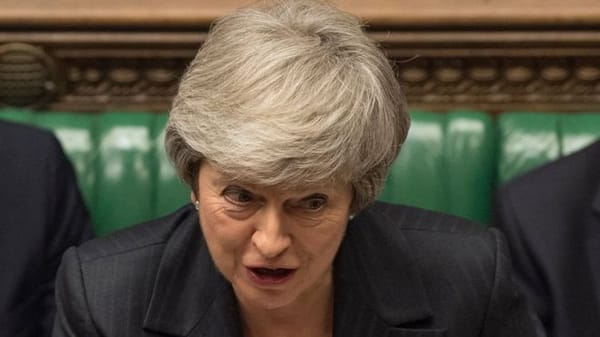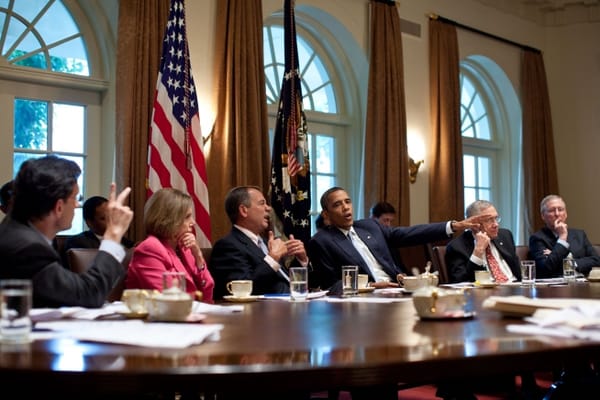May’s Brexit deal voted down by calamitous margin
Theresa May’s deal has been soundly rejected by Parliament. She has wilfully plunged this country into crisis.

Theresa May lost the vote on her Withdrawal deal by 230 votes, and she only has herself to blame. This defeat was an inevitable consequence of the incompetent way she has handled Brexit.
Theresa May’s problems are profound and difficult to solve but she gave herself no chance at all by her approach to Brexit. She has consistently treated Brexit as an exercise in party management between the Brexiteers and her pro-remain MPs rather than as the defining issue of the day. This was never going to work, and any deal would have required some level of cross-party support to pass the House of Commons. Theresa May has the sublime ability to pretend and act as if she has a massive majority when this is simply not the case. The numbers are simply not in her favour, and she should have spent this time reaching consensus within Parliament for a deal that she could have then taken to the EU as the starting point for negotiations. This is not new information, as this has been evident since her botched 2017 election.
This approach is unacceptable to fanatical Brexiteers, but their power is overstated. They didn’t have the numbers to topple Theresa May in a vote of no confidence in her as leader of the party, and they certainly would be powerless in the face of cross-party support for a deal. The one move these Tory Brexiteers have left is to leave the party and vote against her in a vote of no confidence. What would happen afterwards though? A general election where they wouldn’t stand a chance of winning and the outcome would be in all likelihood a softer Brexit. The only reason the Brexiteers are happy at this point is because if Parliament cannot agree on anything then the UK leaves on no deal terms. This is a game of high stakes poker, but ultimately the Brexiteers will lose with remain MPs also prepared to go to extraordinary lengths to prevent a no deal Brexit. If the rest of Parliament is able to work together then the Brexiteer cause will be dead in the water.
What the country needs is a Prime Minister with the confidence to stand against those in her own party who are Brexit ideologues who would in all likelihood be unhappy with any deal. Doing so even at the risk of splitting the Conservative party. This kind of split would be the first of its kind since Peel in the 19th century, but the Conservative party survived and would ultimately survive another split. This reckoning has been on the horizon since Brexit happened. Time and time again rather than facing this head on, May has dithered, wasted time and kicked the can down the road, putting the interests of her party ahead of the country. She has been the architect of the constitutional crisis between Parliament and the government. MPs have resorted to Parliamentary guerrilla warfare, passing motions and amendments to seize control from the government over Brexit in the absence of any leadership or solutions from the government. Our system was never designed for this.
It’s promising that Theresa May has agreed to meet with the leaders of other parties to find a way forward and signals that she may compromise towards a soft Brexit, highlighting the waste of time everything up to this point. Given that other leaders have met with Theresa May, it’s disappointing that Corbyn has so far not taken part in these meetings. It would appear to be solely a political decision to avoid making any tough decisions himself and to not appear to be supporting the government and the Conservatives. May will need to give up several of her red lines and bargaining chips including no deal if she is to make any progress in talks with opposition leaders anyway. By taking part in the talks Labour and the other opposition parties stand a much better chance of pushing Theresa May towards a soft Brexit with a customs union. This could be a great opportunity for Corbyn to doge the ever-present problem of whether to back a second referendum and deliver a Brexit that would be most palatable to his party members. Once Brexit happens, things may well become easier for Corbyn. Pro-EU Labour members and MPs will gain far less traction in calls for a second referendum with the wider public once the issue appears settled. Corbyn can then focus on his attention on bashing the Tories over cuts and the NHS, certainly more natural territory for him.
Brexit has been fascinating to follow and will continue to deliver. We are entering a new stage of this process, and anyone would be a fool for confidently calling the outcome now. Any one of no deal, a referendum or a new deal could still happen. A referendum feels unlikely as it will not happen with May as Prime Minister and if one thing has been consistent over the last few years is her steadfastness. No deal shouldn’t happen if Parliament gets its act together aided by the Speaker leaving some kind of soft deal as the most likely outcome.








